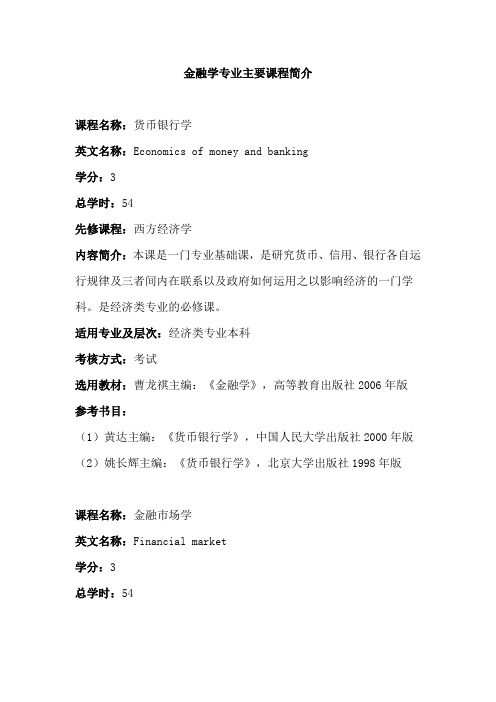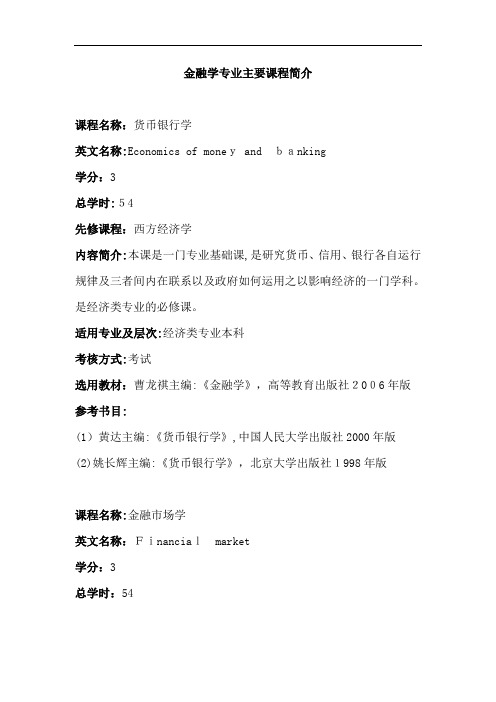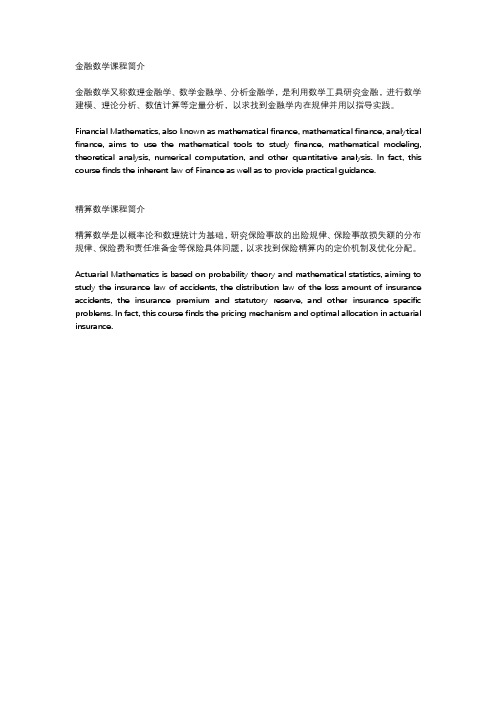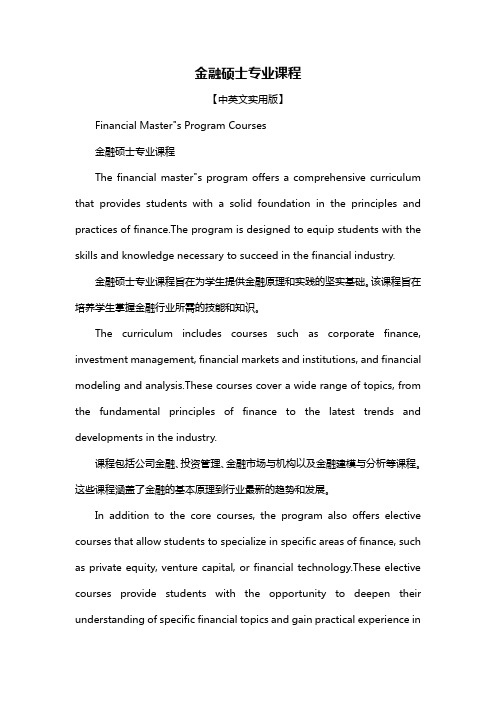金融学系课程介绍(中英对照)
金融学专业主要课程简介

金融学专业主要课程简介课程名称:货币银行学英文名称:Economics of money and banking学分:3总学时:54先修课程:西方经济学内容简介:本课是一门专业基础课,是研究货币、信用、银行各自运行规律及三者间内在联系以及政府如何运用之以影响经济的一门学科。
是经济类专业的必修课。
适用专业及层次:经济类专业本科考核方式:考试选用教材:曹龙祺主编:《金融学》,高等教育出版社2006年版参考书目:(1)黄达主编:《货币银行学》,中国人民大学出版社2000年版(2)姚长辉主编:《货币银行学》,北京大学出版社1998年版课程名称:金融市场学英文名称:Financial market学分:3总学时:54先修课程:《宏微观经济学》、《货币银行学》、《财政学》、《高等数学》等内容简介:现代金融市场是现代金融经济的核心,它在金融经济体系中占据着极其重要的地位。
《金融市场学》是研究市场经济条件下,现代金融市场运行机制及其各主体行为规律的科学。
本课程的教学目的是要求学生掌握现代金融市场的基本理论、基本知识和基本技能;掌握现代金融市场的各种运行机制、金融资产的定价方法、主要金融变量的相互关系及各主体的行为,并运用所学理论、知识和方法解决金融市场的相关问题。
为日后进一步深造或从事实际工作奠定扎实的理论基础。
本课程是金融学专业核心课程,力图使学生全面掌握市场经济条件下现代金融市场运行的原理和规律,培养适应经济全球化、金融国际化的人才,具有十分重要的意义。
适用专业及层次:金融学专业本科二年级考核方式:考试选用教材:张亦春主编(著):《金融市场学》,高等教育出版社2002年版参考书目:(1)谢百三主编:《金融市场学》,北京大学出版社2004年版出版社(2)夏德仁、王振山主编:《金融市场学》东北财经大学出版社2002年版课程名称:国际金融学 (双语)英文名称:International monetary and financial economics学分: 3总学时:54先修课程:微观经济学; 宏观经济学; 货币银行学内容简介:本课程主要介绍和讲述国际金融领域传统的和最新的原理和政策,主要内容包括:1、国际支付和交易体系(主要说明国际货币金融交易活动的衡量、这些活动所遵循的的规则框架以及对这些活动起促进作用的外汇市场及其价格)。
金融学专业主要课程简介3

金融学专业主要课程简介31. 金融市场与投资学1.1 课程目标金融市场与投资学是金融学专业中的核心课程之一。
该课程旨在让学生对金融市场的基本原理和投资策略有深入的了解,掌握金融市场与投资决策的基本理论和方法,为未来从事金融投资和管理工作奠定基础。
1.2 课程内容课程内容包括以下方面:•金融市场的基本概念与结构•金融市场中的金融工具(股票、债券、衍生品等)以及其定价和交易机制•投资组合理论和资产定价模型•投资组合的风险与收益分析•投资者行为与市场效率1.3 教学方法本课程采用理论教学与实践相结合的授课方法,包括理论讲解、案例分析和模拟交易等多种教学手段。
学生将通过大量的实例和案例分析,掌握金融市场与投资策略的基本原理和实际操作技巧。
2. 资产定价与风险管理2.1 课程目标资产定价与风险管理是金融学专业中的重要课程之一。
该课程旨在让学生熟悉不同资产定价模型和风险管理工具,具备对金融市场中各类风险进行有效管理的能力,为未来从事风险管理和投资决策工作打下坚实的基础。
2.2 课程内容课程内容包括以下方面:•资产定价模型(CAPM模型、APT模型等)的原理和应用•期权定价理论与实践•风险管理工具与策略(如衍生品的应用等)•风险度量与风控技术2.3 教学方法本课程采用理论教学与实践相结合的授课方法,包括理论讲解、案例分析和计算实践等多种教学手段。
学生将通过大量的实例和案例分析,掌握资产定价和风险管理的基本原理和实际操作技巧。
3. 金融机构管理与监管3.1 课程目标金融机构管理与监管是金融学专业中的重要课程之一。
该课程旨在让学生了解金融机构的组织结构、运营管理和监管制度,掌握金融机构管理与监管的理论和方法,为未来从事金融机构管理和监管工作提供基础知识和技能支持。
3.2 课程内容课程内容包括以下方面:•金融机构的组织结构与运营管理•信贷管理与风险控制•资本充足率与风险管理•金融监管的基本原理与制度•金融机构的治理与合规3.3 教学方法本课程采用理论教学与实践相结合的授课方法,包括理论讲解、案例分析和实地考察等多种教学手段。
金融学专业主要课程简介

金融学专业主要课程简介课程名称:货币银行学英文名称:Economics of money and banking学分:3总学时:54先修课程:西方经济学内容简介:本课是一门专业基础课,是研究货币、信用、银行各自运行规律及三者间内在联系以及政府如何运用之以影响经济的一门学科。
是经济类专业的必修课。
适用专业及层次:经济类专业本科考核方式:考试选用教材:曹龙祺主编:《金融学》,高等教育出版社2006年版参考书目:(1)黄达主编:《货币银行学》,中国人民大学出版社2000年版(2)姚长辉主编:《货币银行学》,北京大学出版社1998年版课程名称:金融市场学英文名称:Financialmarket学分:3总学时:54先修课程:《宏微观经济学》、《货币银行学》、《财政学》、《高等数学》等内容简介:现代金融市场是现代金融经济的核心,它在金融经济体系中占据着极其重要的地位。
《金融市场学》是研究市场经济条件下,现代金融市场运行机制及其各主体行为规律的科学。
本课程的教学目的是要求学生掌握现代金融市场的基本理论、基本知识和基本技能;掌握现代金融市场的各种运行机制、金融资产的定价方法、主要金融变量的相互关系及各主体的行为,并运用所学理论、知识和方法解决金融市场的相关问题。
为日后进一步深造或从事实际工作奠定扎实的理论基础。
本课程是金融学专业核心课程,力图使学生全面掌握市场经济条件下现代金融市场运行的原理和规律,培养适应经济全球化、金融国际化的人才,具有十分重要的意义。
适用专业及层次:金融学专业本科二年级考核方式:考试选用教材:张亦春主编(著):《金融市场学》,高等教育出版社2002年版参考书目:(1)谢百三主编:《金融市场学》,北京大学出版社2004年版出版社(2)夏德仁、王振山主编:《金融市场学》东北财经大学出版社2002年版。
介绍金融学的英语

介绍金融学的英语English:Finance is the study of how individuals, businesses, and organizations manage and allocate their resources over time. It encompasses a wide range of topics, including investing, borrowing, lending, budgeting, and risk management. Financial professionals analyze data to make informed decisions about how to invest money, manage debt, and plan for the future. The field of finance also examines how financial markets operate, including the stock market, bond market, and other key aspects of the global financial system. Additionally, finance plays a crucial role in driving economic growth and development, as it enables businesses to raise capital and individuals to build wealth for the future.中文翻译:金融学是一门研究个人、企业和组织如何在时间上管理和配置资源的学科。
它涵盖了广泛的主题,包括投资、借贷、贷款、预算和风险管理。
金融专业人士分析数据,做出关于如何投资资金、管理债务和规划未来的决策。
金融学复习资料中英文对照

经济学:是研究一个社会如何决定生产,怎样生产和怎样分配的一门社会学科。
Economics:The study of how society decides what gets produced and how, and who gets what.微观经济学:研究个体经济单位如个人、企业的行为决策。
Microeconomics :The branch of economics that studies the behavior of individual decision-making units such as households and business firms.宏观经济学:研究所有的个人、企业作为总体货总量时的行为决策。
Macroeconomics :The branch of economics that studies the aggregate, or total, behavior of all households and firms.金融:研究金融体系如何协调并融通借贷资金,以及金融中介在此过程中进行的资金创造。
Finance:The study of how the financial system coordinates and channels the flow of funds from lenders to borrowers—and vice versa—and how new funds are created by financial intermediaries during the borrowing process.放松管制:废除或逐步撤销现有的管制。
Deregulation:The removing or phasing out of existing regulations.货币:可以接受且通常用来交换商品和服务的交换工具。
Money:Something acceptable and generally used as payment for goods and services.储蓄:收入中未被消费的部分。
金融数学精算数学课程简介(中英)

金融数学课程简介金融数学又称数理金融学、数学金融学、分析金融学,是利用数学工具研究金融,进行数学建模、理论分析、数值计算等定量分析,以求找到金融学内在规律并用以指导实践。
Financial Mathematics, also known as mathematical finance, mathematical finance, analytical finance, aims to use the mathematical tools to study finance, mathematical modeling, theoretical analysis, numerical computation, and other quantitative analysis. In fact, this course finds the inherent law of Finance as well as to provide practical guidance.精算数学课程简介精算数学是以概率论和数理统计为基础,研究保险事故的出险规律、保险事故损失额的分布规律、保险费和责任准备金等保险具体问题,以求找到保险精算内的定价机制及优化分配。
Actuarial Mathematics is based on probability theory and mathematical statistics, aiming to study the insurance law of accidents, the distribution law of the loss amount of insurance accidents, the insurance premium and statutory reserve, and other insurance specific problems. In fact, this course finds the pricing mechanism and optimal allocation in actuarial insurance.。
金融市场课程说明中英文

金融市场课程说明的翻译在耶鲁大学的网页(/wiki/Robert_Shiller)上,具有较详细的说明为:Financial institutions are a pillar of civilized society, supporting people in their productive ventures and managing the economic risks they take on. This course seeks to offer understanding of the multiple aspects of our financial methods, as they have come to us through past invention and as they are evolving towards a future where financial tools are even more integrated into our lives than they are today. The course considers the multitude of problems in a rapidly developing world economy from the viewpoint of an evolving financial framework, incorporating theoretical and technical advances as they appear through time.金融机构是文明社会的重要支柱,为投资活动提供支持及风险管理。
本课程旨在从多个方面来理解现代金融的方法和工具。
历史发明给社会带来金融工具,并且与时俱进走向未来,将来会更加融入人们的生活。
本课程将以不断发展的金融框架观点,结合应时的理论和技术进步,对飞速发展的世界经济主要问题进行思考。
金融硕士专业课程

金融硕士专业课程【中英文实用版】Financial Master"s Program Courses金融硕士专业课程The financial master"s program offers a comprehensive curriculum that provides students with a solid foundation in the principles and practices of finance.The program is designed to equip students with the skills and knowledge necessary to succeed in the financial industry.金融硕士专业课程旨在为学生提供金融原理和实践的坚实基础。
该课程旨在培养学生掌握金融行业所需的技能和知识。
The curriculum includes courses such as corporate finance, investment management, financial markets and institutions, and financial modeling and analysis.These courses cover a wide range of topics, from the fundamental principles of finance to the latest trends and developments in the industry.课程包括公司金融、投资管理、金融市场与机构以及金融建模与分析等课程。
这些课程涵盖了金融的基本原理到行业最新的趋势和发展。
In addition to the core courses, the program also offers elective courses that allow students to specialize in specific areas of finance, such as private equity, venture capital, or financial technology.These elective courses provide students with the opportunity to deepen their understanding of specific financial topics and gain practical experience inthe field.除了核心课程外,该项目还提供选修课程,允许学生专攻金融的特定领域,例如私募股权、风险投资或金融科技。
- 1、下载文档前请自行甄别文档内容的完整性,平台不提供额外的编辑、内容补充、找答案等附加服务。
- 2、"仅部分预览"的文档,不可在线预览部分如存在完整性等问题,可反馈申请退款(可完整预览的文档不适用该条件!)。
- 3、如文档侵犯您的权益,请联系客服反馈,我们会尽快为您处理(人工客服工作时间:9:00-18:30)。
金融学系课程介绍(中英对照)序号:1课程编码:课程名称:金融学Finance学分:4周学时:3开课系部:金融学系预修课程:微观经济学修读对象:本科生课程简介:从分析金融运作对象——货币、货币资金、金融工具、金融资产入手,阐述货币时间价值原理;介绍金融机构体系和金融市场体系的具体类型及业务,说明其在现代经济中的重要作用;研究货币政策及作为其依据的货币理论等。
通过本课程的学习,使学生了解金融学的基本概念与基础知识,熟悉金融学原理体系、分析框架及思维方式,从而为以后的专业课学习打下扎实的基础。
拟用教材:《金融学》,杨长江编著,复旦大学出版社,2005年1月第1版参考教材:《金融学原理》,彭兴韵著,生活•读书•新知三联书店,2003年9月第1版Course Code:Course Name: Money & FinanceDepartment: Finance DepartmentCredit: 3Periods Per Course: 3Students: UndergraduatesPrerequisite Course: MicroeconomicsContents: The framework of this course starts with the analysis of financial operation objects, such as currency, funds, financial tools and assets. Also the course explains theprinciples of the currency time value, introduces the concrete classification andbusiness of financial instruments and markets, and then points out its significance tothe contemporary economy. It discusses the monetary policy and theories. From thecourse students will get the basic concepts and fundamental knowledge of finance,and be acquainted with financial principle and analysis methods. Those will helpthem to improve their consequent study of specialized courses.Course book:《Finance》, Yangchangjiang, Fudan University Press, first edition, Jan,2005 Reference book:《Fundamentals of Finance》, Pengxingyun, Sanlian Press, first edition, Sep.2003序号:2课程编码:课程名称:国际金融学International Finance学分:3周学时:3开课系部:金融学系预修课程:金融学、宏观经济学修读对象:本科生课程简介:“国际金融”作为金融专业的一门学科基础课,是专门研究国与国之间的货币金融关系的,其具体的教学内容有:(1)国际收支;(2)外汇供与外汇汇率;(3)外汇管制和外汇管理体制改革;(4)国际储备和国际清偿力;(5)国际货币体系与国际货币改革;(6)国际金融市场的运作与监管;(7)国际资本流动和亚洲金融危机的教训;(8)国际金融一体化进程与欧洲货币联盟;(9)国际债务问题等。
通过本课程的学习,学生将掌握国际金融的基本理论、基本政策及国际金融市场的初步知识,为今后进行国际经济交易和从事国际金融管理活动打下坚定的基础。
拟用教材:《国际金融》,刘思跃主编,武汉大学出版社,2002年5月第2版参考教材:《国际金融教程》,胡云祥主编,立信会计出版社,2004年版Course Code: 16002020、16002030Course Name: International FinanceDepartment: Finance DepartmentCredit: 3Periods Per Course: 3Students: UndergraduatesPrerequisite Course: Money & Finance,MacroeconomicsContents: International Finance, a fundamental course in the major of Finance, is designed to study the relationship of currencies and finance between different countries. Itincludes: 1. International Balance of Payment; 2. Foreign Exchange Supply &Demand and Exchange Rate; 3. Reform of Foreign Exchange Control and ForeignExchange Management; 4. International Reserve and International Liquidity; 5.International Currency System and International Currency Reform; 6. Operation andMonitoring of International Financial Market; 7. International Capital Flow and theLessons of Asian Financial Crisis; 8. Process of International Financial Integrationand European Currency Union; 9. International Debts and so on.. After studying thecourse, students can have knowledge about the primary theories of internationalfinance, understand the basis for the policies of foreign exchange, internationalreserve, absorbing foreign investment and financial openness, have a rough idea aboutthe operation of international financial market and its trading skills so as to lay aconcrete foundation for taking foreign economic and managerial work.Course book:《International Finance》, Liusiyue, Wuhan University Press, Second edition, May, 2002Reference book:《A course of International Finance》,Huyunxiang,Lixin Accounting Press,2004序号:3课程编码:16003020课程名称:金融市场学Financial Market学分:3周学时:3开课系部:金融学系预修课程:金融学修读对象:本科生课程简介:金融市场学是金融学专业的基础性专业课。
金融市场是金融资产的交易市场,它主要包括货币市场、资本市场、金融衍生市场、黄金市场等。
货币市场的主要交易对象为短期债务工具,资本市场的主要交易对象为长期的金融工具。
金融资产投资价值取决于未来的现金流,但是现金流大多数情况下是一个预期的不确定性因素,所以金融资产的价格决定具有风险性。
本课程以各种金融市场为研究对象,帮助学生掌握金融资产与负债及其在不断变化的金融条件下的关系,阐述利率机制、定价机制、监管机制、汇率机制和风险机制等金融市场机制,并学习金融市场监管和金融市场一体化的基本理论与实务。
拟用教材:《金融市场学》,张亦春主编,郑振龙编著,高等教育出版社出版社,2003年7月第1版参考教材:《金融市场学》,王兆星、吴国祥、陈世河主编,中国人民大学出版社,2004年2月Course Code: 16003020Course Name: Financial MarketDepartment: Finance DepartmentCredit: 3Periods Per Course: 3Students: UndergraduatesPrerequisite Course: Money & FinanceContents: Financial market is one of the basic core courses of the major of finance. It includes money markets for short-term debt instruments and capital markets forlonger-maturity financial assets. The price of financial asset is equal to the presentvalue of the cash flow expected. The course is to describe the financial markets andinstruments, and to help the students to understand financial assets and liabilities in aworld of constantly changing interest rates, assets prices, regulatory constraints,exchanging mechanism, and international competition and opportunities. And also itis asked the students to learn about the financial market regulation and the integrationof financial market.Course book: 《Financial Market》,Zhangyichun,zhengzhenglong, High Education Press, First edition,Reference book: 《Financial Market》,Wangzaoxing、Wguoxiang、Chenshihe,Renmin University of China Press,Feb.2004序号:4课程编码:16005030、16005020课程名称:商业银行经营管理Commercial Bank Operation & Management学分:3周学时:3开课系部:金融学系预修课程:金融学修读对象:本科生课程简介:商业银行经营管理是金融学专业的核心课程。
